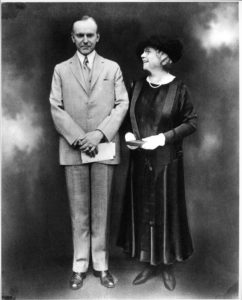During the 2019-2020 Georgia History Festival, members of the Georgia Historical Society Affiliate Chapter Program will explore the legacy of women’s suffrage in their community through submitted blog posts. Using existing historical markers as the basis or inspiration for these posts, contributors will explore how local women have influenced political, civic, and cultural life through the suffrage or anti-suffrage movement, voting, civic action, and literary or artistic pursuits. The posts will explore both the struggle for women’s suffrage and the legacy of that struggle throughout the twentieth century and to examine how these women affected change, both locally and nationally, even when they did not have the right to vote. This month Oak Hill and Martha Berry Museum and Dr. Jennifer Dickey (KSU) explore The Home of Martha Berry historical marker, and Berry’s impact in North Georgia.

“Being a woman, I have no vote,” lamented Berry Schools founder Martha Berry in 1918 regarding the effort to pass a constitutional amendment in Georgia regarding taxation of educational institutions. Not a person to shy away from advocating for a cause, Berry signed her name to the petition, even though, as a woman, she could not vote on the amendment directly. Berry joined the Georgia League of Women Voters, created in April 1920 as the state chapter of the national organization that encourage women “to use their new power to participate in shaping public policy.” Martha Berry and her staff requested “literature, periodicals, etc., for the school library on subjects relating to political matters,” and Berry students were encouraged to engage in debates about political issues. The Mount Berry News reported in March 1920 that “one of the debate topics was ‘Woman Suffrage’ and, after a very warm discussion, the affirmative side won and the speakers are very much gratified to learn that thirty states have recently ratified the bill.” Although there is no written documentation, it seems likely that Martha Berry, as well as the students who argued in support of woman suffrage, were delighted when Tennessee became the thirty-sixth state to ratify the amendment in August 1920, giving women the right to vote.
Martha Berry believed in empowering women, and she knew how to network. Her friendships with wealthy and powerful women provided her with access to donors who supported her school. She befriended philanthropist Emily Vanderbilt Hammond, the great granddaughter of Cornelius Vanderbilt, who not only supported the Berry Schools throughout her lifetime but also brought hundreds of other donors to the schools over the years. Through her membership in the Daughters of the American Revolution, Berry met Mina Edison, wife of Thomas Edison. Through the Edisons, Berry became friends with Henry and Clara Ford. The Fords were the most generous supporters in the history of the Berry Schools.
Martha Berry drew accolades and support from far and wide. In 1925 she was named by Ida Tarbell as one of America’s 50 greatest women and was honored by President Calvin Coolidge with the Theodore Roosevelt Medal of Distinguished Service. Writing to Berry in 1939, author Margaret Mitchell noted that “My husband and I are great admirers of you and, like all other Georgians, we feel an intense personal pride in the Berry Schools and all that you have done.” Mitchell continued, “I know that I would benefit if I could talk for even a few minutes with someone who has shown herself truly great, as you have done.”
Martha Berry’s home, Oak Hill, was one of the earliest sites in Georgia honored with a historical marker in 1954 for her devotion “to providing educational opportunities for the children of her less-fortunate neighbors in the mountains.” Berry College stands today as Martha Berry’s “enduring educational legacy,” representing her unwavering commitment to improving the lives of others.
